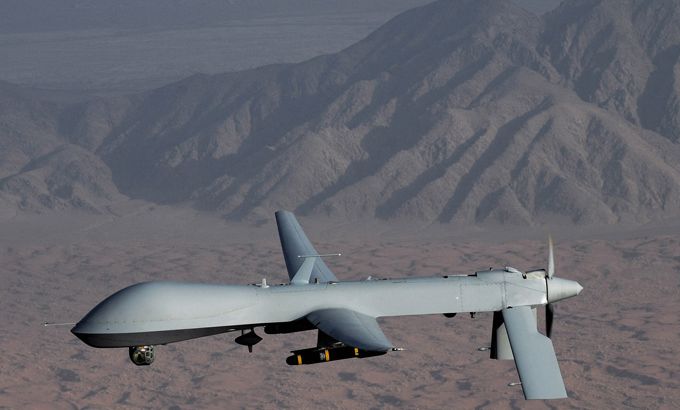
US drones in Africa: Surveillance or strikes?
As the US expands its drone operations in North Africa, we ask how they will impact the already tense region.
The US is opening up a new front against armed groups linked to al-Qaeda in Africa. And Niger is reported to have given permission for US drones to be based in its territory.
|
“The Horn of Africa really has been the focus of [the US] Africa Command, or Africom, operations over the past several years, particularly with drone surveillance or UAV surveillance, they’ve not really been able to expand westward into North Africa or the Maghreb. This would be crucial in giving them observation in areas like Mali or Niger even further west in Africa.” – Robert Densmore, the editor of Defence Report |
Hillary Clinton, the outgoing US secretary of state, has said the US faces a serious threat from armed groups in the region.
Al-Qaeda in the Islamic Maghreb (AQIM) and associated groups are spread across this swathe of sub-Saharan Africa. And the 2011 war in Libya has left an array of heavily armed fighters, ready for battle at home or beyond.
Meanwhile, Boko Haram fighters in Nigeria have carried out numerous attacks against Christians and churches.
Al-Shabab fighters control many rural parts of southern and central Somalia. And Joseph Kony’s Lord’s Resistance Army (LRA) is active in the border region between South Sudan and the Central African Republic.
The only permanent US base in Africa is in the eastern part of the continent in Djibouti. But it also has drone bases in Morocco, Burkina Faso, Uganda and Ethiopia.
The latest one planned for Niger puts it right in the heart of this region.
|
“It’s been made very clear so far that the purpose of these drones that apparently are going into Niger is for surveillance, it’s not for drone missile strikes …. So in effect what’s going into Niger seems to be replacing what was being done in Burkina Faso but doing it more effectively. But I’d be a little bit leery about making a leap from going from surveillance drones to military strike drones.“ – David Shinn, a former US ambassador to Burkina Faso and Ethiopia |
This expansion of US drone operations comes at a time of heightened tension in North Africa. France is leading an offensive in Mali against al-Qaeda inspired fighters.
Gunmen attacked a gas plant in Algeria earlier this month, killing 35 foreign workers. And European governments have warned their citizens to leave the Libyan city of Benghazi, quoting an ‘imminent threat’ against westerners.
The US drone programme has been criticised for its covert operations – for example in Pakistan. According to the London-based Bureau of Investigative Journalism, the US has launched 362 drone strikes in Pakistan since 2004, killing up to 3,461 Pakistanis. Of those, 891 were said to be civilians. And more than 1,400 people were injured in these attacks.
The UN is to investigate the use of drone strikes, at the request of several nations, including Pakistan. Ben Emmerson, a UN special rapporteur, will look into the extent of civilian casualties and the legality of the strikes.
He told reporters: “One of the fundamental questions is whether aerial targeting using drones is an appropriate method of conflict … where the individuals are embedded in a local community.”
So what does the expansion of US drone operations in Africa entail?
Inside Story, with presenter Shiulie Ghosh, discusses with guests: Robert Densmore, a former US naval flight officer and editor of Defence Report; David Shinn, a professor of International Affairs at George Washington University and former US ambassador to Burkina Faso and Ethiopia; and Noel Sharkey, a professor of Artificial Intelligence and Robotics at the University of Sheffield, and chairman of the international committee for robot arms control.
|
“They can fly at different levels like 30,000 ft or 10,000 ft and they’ve got very, very high resolution cameras. They also have infrared sensing so they can detect heat, and they can look and find out who is around and what they’re doing …. “It depends on who is using them as well, I’m not sure who is going to be using them. Most of the attacks in Somalia and Yemen have been by the CIA and that’s not very good and if it’s the same people in Mali, that’s pretty tragic because they’re expanding this kind of intelligence network all over Africa now and really there’s nobody at war on Africa now and what you’ve got is a hunt for terrorists and some human rights lawyers, quite a few of them now, are saying this is not the laws of war, this is actually human rights law and what we are doing is actually murder.” Noel Sharkey, a professor of Artificial Intelligence and Robotics |